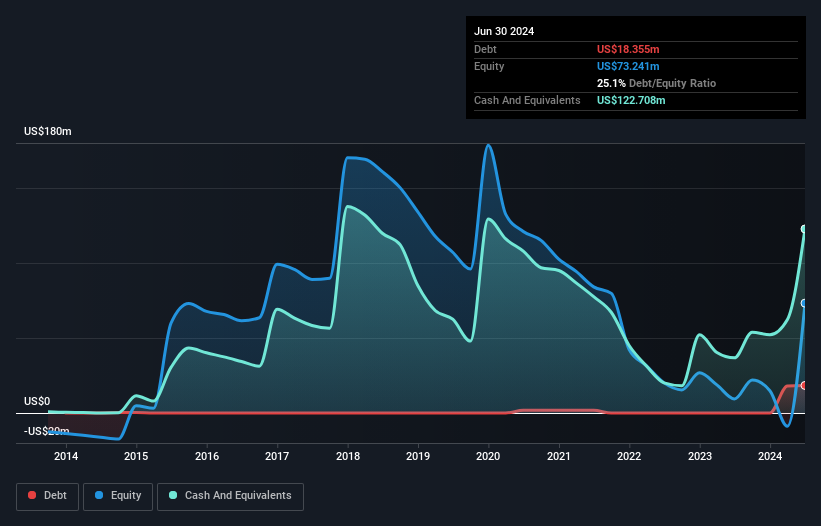
David Iben put it well when he said, 'Volatility is not a risk we care about. What we care about is avoiding the permanent loss of capital.' So it seems the smart money knows that debt - which is usually involved in bankruptcies - is a very important factor, when you assess how risky a company is. We note that Abeona Therapeutics Inc. (NASDAQ:ABEO) does have debt on its balance sheet. But the real question is whether this debt is making the company risky.
When Is Debt A Problem?
Generally speaking, debt only becomes a real problem when a company can't easily pay it off, either by raising capital or with its own cash flow. If things get really bad, the lenders can take control of the business. However, a more frequent (but still costly) occurrence is where a company must issue shares at bargain-basement prices, permanently diluting shareholders, just to shore up its balance sheet. Of course, plenty of companies use debt to fund growth, without any negative consequences. When we think about a company's use of debt, we first look at cash and debt together.
Check out our latest analysis for Abeona Therapeutics
How Much Debt Does Abeona Therapeutics Carry?
You can click the graphic below for the historical numbers, but it shows that as of June 2024 Abeona Therapeutics had US$18.4m of debt, an increase on none, over one year. But on the other hand it also has US$122.7m in cash, leading to a US$104.4m net cash position.

How Healthy Is Abeona Therapeutics' Balance Sheet?
According to the last reported balance sheet, Abeona Therapeutics had liabilities of US$16.8m due within 12 months, and liabilities of US$43.9m due beyond 12 months. On the other hand, it had cash of US$122.7m and US$1.64m worth of receivables due within a year. So it actually has US$63.6m more liquid assets than total liabilities.
This surplus suggests that Abeona Therapeutics is using debt in a way that is appears to be both safe and conservative. Due to its strong net asset position, it is not likely to face issues with its lenders. Succinctly put, Abeona Therapeutics boasts net cash, so it's fair to say it does not have a heavy debt load! The balance sheet is clearly the area to focus on when you are analysing debt. But it is future earnings, more than anything, that will determine Abeona Therapeutics's ability to maintain a healthy balance sheet going forward. So if you want to see what the professionals think, you might find this free report on analyst profit forecasts to be interesting.
Given its lack of meaningful operating revenue, Abeona Therapeutics shareholders no doubt hope it can fund itself until it has a profitable product.
So How Risky Is Abeona Therapeutics?
We have no doubt that loss making companies are, in general, riskier than profitable ones. And the fact is that over the last twelve months Abeona Therapeutics lost money at the earnings before interest and tax (EBIT) line. And over the same period it saw negative free cash outflow of US$44m and booked a US$53m accounting loss. While this does make the company a bit risky, it's important to remember it has net cash of US$104.4m. That means it could keep spending at its current rate for more than two years. Overall, its balance sheet doesn't seem overly risky, at the moment, but we're always cautious until we see the positive free cash flow. There's no doubt that we learn most about debt from the balance sheet. However, not all investment risk resides within the balance sheet - far from it. We've identified 3 warning signs with Abeona Therapeutics (at least 2 which are potentially serious) , and understanding them should be part of your investment process.
If, after all that, you're more interested in a fast growing company with a rock-solid balance sheet, then check out our list of net cash growth stocks without delay.
New: Manage All Your Stock Portfolios in One Place
We've created the ultimate portfolio companion for stock investors, and it's free.
• Connect an unlimited number of Portfolios and see your total in one currency
• Be alerted to new Warning Signs or Risks via email or mobile
• Track the Fair Value of your stocks
Have feedback on this article? Concerned about the content? Get in touch with us directly. Alternatively, email editorial-team (at) simplywallst.com.
This article by Simply Wall St is general in nature. We provide commentary based on historical data and analyst forecasts only using an unbiased methodology and our articles are not intended to be financial advice. It does not constitute a recommendation to buy or sell any stock, and does not take account of your objectives, or your financial situation. We aim to bring you long-term focused analysis driven by fundamental data. Note that our analysis may not factor in the latest price-sensitive company announcements or qualitative material. Simply Wall St has no position in any stocks mentioned.
About NasdaqCM:ABEO
Abeona Therapeutics
A clinical-stage biopharmaceutical company, develops gene and cell therapies for life-threatening diseases.
High growth potential with adequate balance sheet.
Similar Companies
Market Insights
Community Narratives



